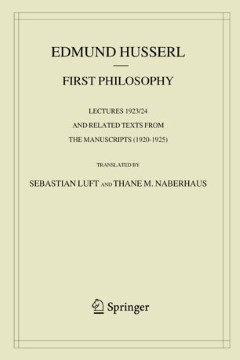The historical beginnings of the science of subjectivity
pp. 54-79
Abstract
To [the foregoing] we make the following reply. Coming from logic, which was emerging as a doctrine of method for genuine cognition and genuine science, and, in parallel with this, from ethics, which had likewise begun to develop as a doctrine of method for practically rational, "ethical," behavior, one was driven from the start to direct a theoretical interest towards cognizing and acting subjectivity in its rational and non-rational activity. In just this respect the kind of Sophistic attacks against the possibility of cognition had to have a motivating force. The path to be pursued was predelineated through the natural, naive view of the world.
Publication details
Published in:
Husserl Edmund (2019) First philosophy: lectures 1923/24 and related texts from the manuscripts (1920-1925). Dordrecht, Springer.
Pages: 54-79
DOI: 10.1007/978-94-024-1597-1_4
Full citation:
Husserl Edmund (2019) The historical beginnings of the science of subjectivity, In: First philosophy, Dordrecht, Springer, 54–79.


